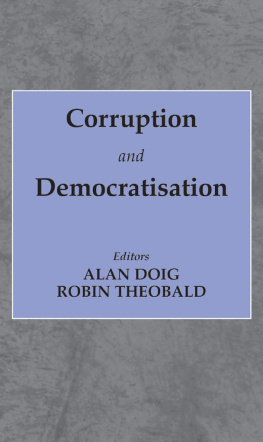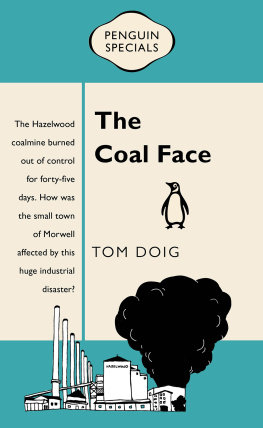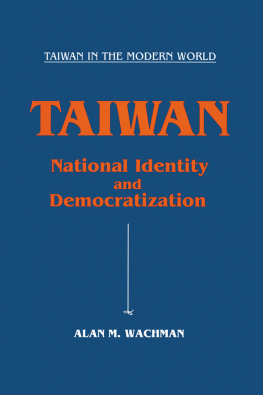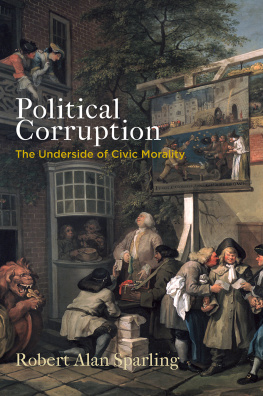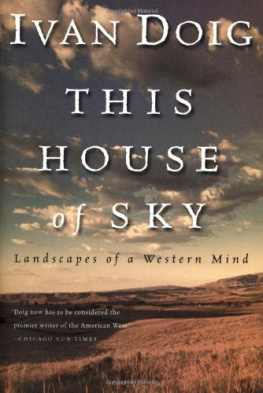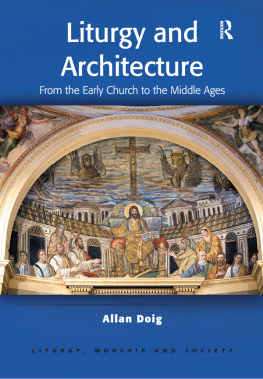CORRUPTION AND DEMOCRATISATION
BOOKS OF RELATED INTEREST
The Resilience of Democracy: Persistent Practice, Durable Idea
Edited by Peter Burnell and Peter Calvert
Civil Society and Democracy in Africa
Edited by Nelson Kasfr
Democracy in Argentina: Hope and Disillusion
By Laura Tedesco
Civil Society: Democratic Perspectives
Edited by Robert Fine and Shirin Rai
Democracy and North America
Edited by Alan Ware
Democratisation and the Media
Edited by Vicky Randall
Corruption and
Democratisation
Editors
ALAN DOIG
ROBIN THEOBALD
First published in 2000 in Great Britain by
FRANK CASS AND COMPANY LIMITED
Newbury House, 900 Eastern Avenue, London IG2 7HH, England
and in the United States of America by
FRANK CASS
c/o International Specialized Book Services, Inc.
5804 N.E. Hassalo Street, Portland, Oregon 972133644
Copyright 2000 Frank Cass & Co. Ltd
Reprinted 2003
Website: www.frankcass.com
British Library Cataloguing in Publication Data
Corruption and democratisation
1. Political corruption 2. Political corruption Case studies 3. Representative government and representation
4. Representative government and representation Case studies
I. Doig, Alan II. Theobald, Robin
364.1323
ISBN 0 7146 4996 1 (hb)
ISBN 0 7146 8057 5 (pb)
ISBN 978-1-135-30065-4 (ePub)
Library of Congress Cataloging-in-Publication Data
Corruption and democratisation/editors, Alan Doig, Robin Theobald.
p. cm.
ISBN 0-7146-4996-1 (hb). ISBN 0-7146-8057-5 (pb)
1. Political corruption. 2. Democratization. I. Doig, Alan.
| II. Theobald, Robin. |
| JF1081.C656 1999 | 99-40344 |
| 364.1323 dc21 | CIP |
This group of studies first appeared in a Special Issue of the Journal of Commonwealth & Comparative Politics, Vol.37, No.3 (November 1999), [Corruption and Democratisation].
All rights reserved. No part of this publication may be reproduced, stored in or introduced into a retrieval system, or transmitted, in any form, or by an means, electronic, mechanical, photocopying, recording, or otherwise, without the prior written permission of the publisher of this book.
Printed in the UK by Antony Rowe Ltd
Contents
Towards the end of his first year in office, World Bank president, James Wolfensohn, identified corruption as a major global problem. In the 50 odd countries Wolfensohn had visited during his debut year, corruption was the most predominant issue of public concern. In July 1996, whilst visiting the G7 summit in Lyons, Wolfensohn warned that the extent of corruption in developing and transitional economies was undermining public support for spending on overseas aid. When voters think that their money is going into a few peoples pockets and Swiss bank accounts, that erodes the whole quality of the assistance package. In fact, by 1996 there were already signs of serious aid fatigue, with the US cutting overseas aid by around one-third and major donors such as Britain and France reducing aid budgets by four to six per cent. The US decided not to contribute at all during the period 199799 to the International Development Agency, the UNs soft lending arm aimed at funding projects in the poorest countries (mainly in Tropical Africa). In addition to its effects on aid, corruption is also widely held to deter investment, undermine good government, distorting government policy and leading to a misallocation of resources:
In a corrupt environment, resources may be directed towards nonproductive areas the police, the armed forces and other organs of social control as the elite move to protect themselves, their positions and their material wealth. Resources otherwise available for socio-economic development will be diverted into security expenditure. This, in turn, can cause the weakening of market institutions as rentseeking, rather than investment becomes the major objective of policy makers.
Corruption, in addition, bears down most heavily upon the poorest sections of society who must ultimately bear the cost of the distortions and deprivations it produces.
The importance of combating corruption was also signalled in one of Kofi Annans early interviews after his appointment as Secretary General of the United Nations. Economic development on the continent of Africa, the Secretary General affirmed, implies good governance, competent elites, and above all, the disappearance of corruption. In December 1996 the
With regard to this last point, the United States has for some time been pressing other developed countries to outlaw foreign commercial bribery by their corporations along the lines of the Foreign Corrupt Practices Act (FCPA) of 1977. The view of the Clinton administration is that US firms lose tens of billions of dollars every year because foreign rivals are able to pay bribes to win contracts. In many OECD countries, not only is bribery not illegal, such payments can be offset against tax.
Other international organisations that have recently inveighed against the evils of corruption are the International Monetary Fund, the World Economic Forum (which in 1995 established the Davos Group), the World Trade Organisation, the International Chamber of Commerce, the Organisation of Latin American States, the 29-member Organization for Economic Co-operation and Development, the G7 group of industrialised nations and the European Union.
In addition to governmental and public international organisations working against corruption are NGOs (non-governmental organisations), probably the best known and most active in this field being Transparency International (TI). Established by former World Bank employees in 1993, TIs mission is to curb corruption through international and national coalitions encouraging governments to establish and implement effective laws, policies and anti-corruption programmes as well as to strengthen public support and understanding for anti-corruption programmes and enhance public transparency and accountability in international business transactions and in the administration of public procurement. By the middle of 1998 there were 70 such national chapters.
As many commentators have noted, until the 1990s the term corruption figured hardly at all in the discourse of international organisations both public and private. On the contrary, many states that were known to be thoroughly corrupt were in receipt of very substantial loan and aid packages. Why then this tidal wave of concern about a phenomenon that according to many commentators has always existed? Have the 1990s seen a sudden upsurge in corruption? If so, why?
WHY CORRUPTION?
First, we need to try and identify the phenomenon with which we are concerned, unfortunately by no means an easy task. However, in order to short-circuit an interesting but none the less time-consuming debate, it will be helpful to identify the essence of political corruption as the abuse of public authority for private profit. Although such a definition leaves much to be desired, it will serve to demarcate the general phenomenon with which we are concerned: the public official, appointed or elected, who uses his/her authority illegitimately or illegally to advance his/her own interests. The diverse manifestations of corrupt transactions have been identified as ranging from:


